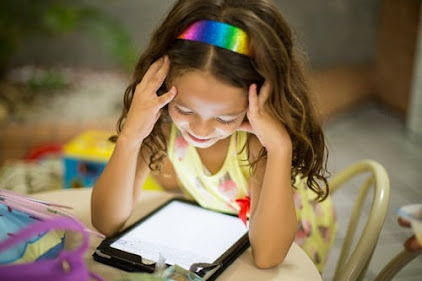Short & easy activities for brain breaks
As all educational institutions are closed due to the Covid-19 lockdown, kids are at home all day, for a long time as of now.
Being home all day, with no-school, deprives them of their social interaction, engaging in active learning and meaningful play.
In addition to that, the demands of online sessions & expectations of parents & teachers puts an extra load of stress to a child's mind.
Being a pediatric occupational therapist, I come across many parents who have this common complaint (especially during this lockdown period), that; their child is not so attentive in online classes, not interested to listen to the teacher or to follow instructions, taking frequent breaks in between the sessions, or showing unusual tantrums.
Why ?
Kids are not used to sitting in front of computers for extended periods of time or in one spot!
They need to move, to interact with other children, to have a hands-on experience for an all round effective learning.
You might think your kiddo is acting out, but really they just need a break.
So, the need for introducing brain-breaks into a child's schedule is much more necessary now than ever before...
What are Brain breaks?
Brain breaks are short mental breaks (4-5min.) designed to help students focus better. They are planned to get the students moving and allow blood & oxygen to flow to the brain. These breaks give students a small reset to relax and enhance their energy.
Science behind brain breaks
Our brain uses neurotransmitters to send messages across pathways. When doing the same task for a period of time, those transmitters begin to deplete. Research shows that short breaks allow the replenishment of the neurotransmitters & regions of the brain that are blocked by stress or high-intensity work to revitalize.
What are the benefits of Brain Breaks?
- ☺Improves focus and attention
- ☺Increases motivation in the classroom or online class
- ☺Helps the brain to become calm & organized
- ☺Makes the brain prepared to receive new information
- ☺Enhances active participation in learning
- ☺Academic performance improves.
- ACTIVITIES TO BE USED AS BRAIN BREAKS
- Brain breaks can be alerting or calming, both kinds help to make the brain organized and ready to receive new information. It is best to practice one alerting and one calming brain break activity during 1 short break.
- Or, depending on your child's need, you can choose an activity.
- Example:-
- ⏩ If your child is bored, or inattentive, or disinterested due to long period of focus, you can give him more alerting brain breaks and also more frequent breaks.
- ⏩ If your child is feeling overwhelmed, or showing tantrums, its best to give some calming activities
- Here is a list of some alerting and calming activities and how to use them:-
- ACTIVITIES FOR BRAIN BREAKS
👉Bear walk
👉Crab walk
👉Elephant walk
➤Jogging at a place.
- Here is a list of some easy self-relaxation strategies that children can use themselves for calming down or as a brain break. 👇 (must check)
- https://abhipsaot.blogspot.com/2021/06/15-simple-and-easy-self-relaxation.html
Brain breaks can be used during transitions and especially after lunch/recess.
Why would a kiddo need a brain break after lunch/recess?
👉Lunch and recess can be very stimulating to a kid because it is not structured. Some kids need a brain break to signal to their brain that it is now time to learn.
👉Brain Breaks can be scheduled throughout the day. But they can also be used spontaneously when your kiddo has that glazed-over look when they should be focusing!
Check out when and how to use brain breaks in this video on- Short & easy brain breaks - 2👇
https://youtu.be/UwqwKnHuPaU
When your kids are listening to their teacher, they can be easily distracted. Focusing can be more difficult in an online class if you are tired of sitting, or see something interesting, or hear an interesting sound.
BUT when given the right strategies, kids can increase their focus and not miss out on learning opportunities!
Start including some brain break activities into your child's daily schedule & your child will be able to focus much better with an improvement in academic performance as well. Try out!
About the writer :-
The writer’s name is Abhipsa Parida. She is an occupational therapist specialised in pediatrics and has been handling kids with special needs since 5 years. She is quite experienced and skillful in observation, assessment and planning intervention for kids with special needs. She uses evidence based practice and is very creative and updated in her approach while handling kids with special needs. She has her own clinic in Bhubaneswar and has handled many kids of different age groups with varying needs.
If you have any queries, you can mail them at abhipsaot21@gmail.



















Wow !
ReplyDeleteAbsolutely awesome 👌👌
This topic is very much needed during these times and not just
for kids but for us also. It will help many parents. Everyone should apply these !
Thank you so much for sharing 😊☺☺👍👍
Wow. You have a great knowledge ❤
ReplyDeleteThis is important for kids to do and for parents to know about. If anyone is glued to a computer screen or mobile screen for long periods of time they will have some issues. And some parents don't understand this from a kid's perspective as they are extra worried about the child's educational performance. That is how the current educational system is unfortunately. It doesn't really cater to the 'overall' development of any human being. I am an advocate of building solid foundational mental health for kids. Health is really important and not something to be taken for granted. Else one has to face the consequences. 🙂
ReplyDeleteA very much needed topic in the time of this confined state of mind during lockdown. Very professionally explained good work❤️
ReplyDeletePerfect tips for all students .... specially in this pandemic situation
ReplyDelete